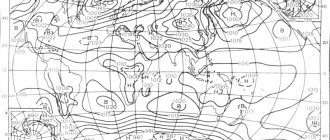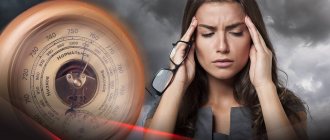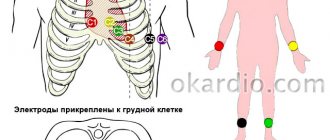Definition and essence
The air in the atmosphere is a mixture of gases that have a certain density. Since the air mass is attracted to the globe, it presses on the entire surface of the planet. Including people.
Atmospheric pressure is the mass of air that presses on a person.
In numerical equivalent, the weight of the air mass that puts pressure on us every day varies between 14 and 16 tons or 1.033/cm³. So why don't we notice such heaviness? This is because the fluids in our body balance the pressure. If the force changes for some reason, the balance is upset.
What is it measured in?
Atmospheric pressure is measured using a barometer and thermohygrometer.
So the units of measurement for pressure are:
- millimeters of mercury (mmHg);
- Pascals;
- bars;
- kg/cm³;
- atmosphere.
What affects the indicator
Atmospheric pressure is a variable indicator; it changes depending on many factors:
- Location of the area above sea level.
- Time of day.
- Weather conditions.
- Climatic conditions.
- Relief.
When ascending one kilometer, the pressure drops by 0.13 from the previous value. For example, a kilometer from sea level, the atmospheric pressure is already 760 and 730 millimeters. This pattern is strictly observed at low altitudes. Then she gets confused.
When descending to a certain depth, the pressure changes in the same proportion.
At night, the pressure increases by 1-2 millimeters of mercury from the daytime value.
Due to the change of cyclones, in which low pressure prevails, and anticyclones, which carry increased atmospheric pressure, the indicator can fluctuate from 641 to 816 mm Hg. Art. at sea level.
Since the human body adapts to living conditions, people have different blood pressure standards. Thus, the norm of a Canadian resident will be significantly different from the norm of an Australian. And even within a country, the indicator may deviate.
Meteor dependence what to do?
The movement of mercury by more than one division in 3 hours is a reason for stress in the strong body of a healthy person. Each of us feels such fluctuations in the form of headaches, drowsiness, and fatigue. More than a third of people suffer from weather dependence to varying degrees of severity. In the zone of high sensitivity are populations with diseases of the cardiovascular, nervous and respiratory systems, and elderly people. How to help yourself if a dangerous cyclone is approaching?
Read also: Why do my legs swell - what to do?
15 ways to survive a weather cyclone
There's not a lot of new advice here. It is believed that together they alleviate suffering and teach the correct way of life in case of weather vulnerability:
- See your doctor regularly. Consult, discuss, ask for advice in case your health worsens. Always have prescribed medications on hand.
- Buy a barometer. It is more productive to track the weather by the movement of the mercury column, rather than by knee pain. This way you will be able to anticipate the approaching cyclone.
- Keep an eye on the weather forecast. Forewarned is forearmed.
- On the eve of a weather change, get enough sleep and go to bed earlier than usual.
- Adjust your sleep schedule. Provide yourself with a full 8 hours of sleep, getting up and falling asleep at the same time. This has a powerful restorative effect.
- Meal schedule is equally important. Maintain a balanced diet. Potassium, magnesium and calcium are essential minerals. Ban on overeating.
- Take vitamins in a course in spring and autumn.
- Fresh air, walks outside - light and regular exercise strengthens the heart.
- Don't overexert yourself. Putting off household chores is not as dangerous as weakening the body before a cyclone.
- Accumulate favorable emotions. A depressed emotional background fuels the disease, so smile more often.
- Clothes made from synthetic threads and fur are harmful due to static current.
- Keep folk remedies for relieving symptoms in a list in a visible place. It’s hard to remember a recipe for herbal tea or a compress when your temples are aching.
- Office workers in high-rise buildings suffer more often from weather changes. Take time off if possible, or better yet, change jobs.
- A long cyclone means discomfort for several days. Is it possible to go to a quiet region? Forward.
- Prevention at least a day before the cyclone prepares and strengthens the body. Do not give up!
Don't forget to take vitamins to improve your health
Atmospheric pressure is a phenomenon that is absolutely independent of humans. Moreover, our body obeys it. What the optimal pressure should be for a person is determined by the region of residence. People with chronic diseases are especially susceptible to weather dependence.
Atmospheric pressure standards
The ideal pressure is 760 millimeters of mercury or 1013.25 millibars. In such conditions a person does not feel any discomfort.
But this indicator is specifically measured above sea level in France at an air temperature of +15 degrees Celsius. It is very rarely found in other parts of the planet.
Since different countries have different topography, all inhabitants of the planet are adapted to their normal pressure. For example, residents of Mexico City do not tolerate the indicator considered normal, since their pressure does not exceed 580 mm Hg. Art.
How does low atmospheric pressure affect human health and well-being?
Typically, a decrease in atmospheric pressure is felt by people with hypotension. A decrease in atmospheric pressure is called a cyclone and is accompanied by precipitation, cloudiness, and increased air humidity.
The effect of lowering atmospheric pressure on humans:
- Decreased performance. The fact is that there is not enough oxygen in the air, which is why the brain does not receive enough nutrition.
- Headache. Due to a decrease in atmospheric pressure, intracranial pressure may increase, which provokes headaches and migraines. There may be painful pulsation in the temple area.
- Bleeding from the nose. Due to increased intracranial pressure, the integrity of the capillaries in the nose may be impaired.
- Disturbance in the functioning of the stomach . Possible diarrhea. But usually there is increased gas formation.
Fluctuations within normal limits
Changes of up to 5 mm are considered normal, and our body copes with them absolutely calmly. In this case, the person does not experience any discomfort or unpleasant sensations.
Fluctuations of 5 to 10 millimeters of mercury can cause discomfort for people with poor health.
More sudden changes can be fatal.
What does a person experience with low atmospheric pressure, what does a hypertensive person experience?
It is worth noting that reduced atmospheric pressure also negatively affects the health of hypertensive patients. They may also feel unwell.
The effect of the cyclone on hypertensive patients:
- Noise in ears. This occurs due to blood thinning. It becomes fluid.
- Dyspnea. During a cyclone, it is very difficult for hypertensive patients to engage in physical labor. They get tired very quickly.
- Increased heart rate . At the same time, the strength of heart contractions decreases. The heart wears out faster. Pain may be felt under the left rib.
Low atmospheric pressure: what to do?
The influence of hell vibrations on the human body
Since balance is achieved through the fluids of our body - blood, lymph, tissue fluid - atmospheric pressure directly affects blood pressure. Changes in one lead to imbalance in the other.
Low barometer reading
A decrease in pressure, which is observed when rising to a height, can lead to the following consequences:
- labored breathing;
- low heart rate;
- fatigue, drowsiness;
- apathy;
- low blood pressure;
- headache;
- attacks of dizziness;
- nausea or vomiting;
- digestive system disorders;
- problems with concentration.
When air pressure decreases, people with respiratory pathologies and usually low blood pressure are at risk. Usually their condition gets worse under such conditions. If a person does not feel changes, such fluctuations can be considered normal for him.
High barometer reading
Fluctuations upward in the mercury column are observed when descending into mines, caves or other lowlands.
Discomfort will differ from low blood pressure:
- ringing in the ears, stuffy ears;
- pulsation in the temples and neck;
- increased blood pressure;
- increased heart rate;
- rush of blood to human skin, redness;
- spots before the eyes;
- headache:
- dizziness;
- nausea or vomiting.
Note!
With elevated atmospheric pressure, heart attacks and strokes often occur. People prone to weather dependence should monitor weather conditions and on days of high blood pressure not overload their body with stress or physical activity.
At-risk groups
If the mercury moves even one division in 2-3 hours, weather-dependent people will feel it. Fatigue, drowsiness, nausea and other unpleasant or even painful symptoms will immediately manifest themselves. Who are classified as people dependent on changes in atmospheric pressure?
Various injuries, diseases or congenital pathologies are the cause of such unpleasant symptoms. So the people who suffer from weather dependence first of all are:
- with high or low blood pressure;
- with respiratory pathologies - asthma, bronchitis, pleurisy, chest injuries, sinusitis, sinusitis;
- with musculoskeletal disorders - arthrosis, osteochondrosis, old injuries;
- with ear diseases;
- after traumatic brain injury or with increased intracranial pressure.
What to do to relieve symptoms
It is very important for middle-aged and older people to take care of their health. Cyclones and anticyclones can cause serious consequences.
To prevent stroke and heart attack, as well as alleviate unpleasant symptoms, you should listen to some tips:
- Consultation with your doctor. He, based on the patient’s characteristics, will be able to select the right drug or, for example, treatment in an oxygen pressure chamber.
- Regularly checking weather conditions. It is necessary to free such days from stress at work and at home.
- Correct sleep schedule. Sleep duration should be at least 7 hours. When the weather changes, it is better to go to bed earlier.
- Proper nutrition. The menu should be balanced and complete. Eliminate fatty foods, but consume foods containing omega 3-6-9 acids.
- Walks in the fresh air (preferably in the evening).
- Moderate physical activity.
- Reduced stress levels.
Doctor - about record low atmospheric pressure: I recommend everyone to reduce speed
A record low pressure was recorded in Moscow - 711 millimeters of mercury. Candidate of Medical Sciences Alla Minurova told MIR 24 TV channel who is most difficult to survive such days and what to do to improve their well-being
— Why do some people physically feel sudden surges in blood pressure?
Baric Mountain
Why is an abnormal rise in atmospheric pressure dangerous? Alla Minurova:
Man is also a part of nature, and we are in direct connection with the level of atmospheric pressure, with the electromagnetic fields of the Earth. As soon as any sharp fluctuations occur, of course, we feel it. Not all people have a very fast adaptation mechanism. Those who were doing well quickly changed lanes and didn’t seem to notice. But many people experience this physically by changing their vital parameters.
— Is sensitivity a sign that something is wrong with the body?
Alla Minurova:
This is probably a bit of a wake-up call, because if there are deficient conditions in the body, if some systems and organs cannot cope, then the adaptation process slows down, it cannot be fast and imperceptible. For some, this will be a call that they need to reconsider the rhythm of life and undergo a medical examination.
Many children also have weather dependence. This may be some kind of feature of the nervous system that a person needs time to adapt to rapidly changing numbers or needs to take care of himself.
— Which is easier to tolerate – low or high blood pressure?
Alla Minurova:
It's individual. But, as a rule, low atmospheric pressure is associated with cloudiness and some precipitation. Perhaps this factor has a slightly worse effect on a person’s mood and general mood. High pressure usually means clear and sunny weather. We even tolerate it more easily.
- Today's situation - 711 mm - for which people is it most difficult?
Alla Minurova:
Those who have diseases of the cardiovascular system also have blood pressure – a tendency to increase or decrease. These are patients who have suffered heart attacks, strokes, or have angina pectoris. Also, such changes in atmospheric pressure can affect patients who have suffered a traumatic brain injury and have epilepsy. This is a fairly large circle of patients. People who have recently undergone surgery and who are under stress will also react. Most of them will react.
— Such changes are accompanied by pain. At this moment, people try to take painkillers. In what situations should this be done, and in what situations should it not be done?
Alla Minurova:
If suddenly, against the background of fairly good health, you realize that you are a little unwell, that you have a slight headache, but it is familiar to you, then you can help yourself with symptomatic means. If you understand that the condition is not typical for you, symptoms that did not exist before, you need to at least measure your blood pressure. This is one of the most important indicators that gives us an idea of the adaptation mechanisms of the human body.
You shouldn’t take a pill and run on: measure your blood pressure, see if everything is normal. You can count your pulse. If it falls within the parameters of 60 - 80 beats per minute, there is no particular concern. If anything is less or more than these numbers, you need to take more care of yourself and maybe consult a doctor.
— If a person knows about his reaction to changes in atmospheric pressure, how to improve his condition? Many feel overwhelmed.
Alla Minurova:
It makes sense to take care of yourself, not to plan important meetings for this day that require maximum concentration and effort from you, where you must prove yourself, where some important decisions depend on you. It probably makes sense to postpone it, because in such a state it is difficult to adequately assess the situation and make some important decisions. It’s better to slightly reschedule important meetings and tasks to other days, give yourself a rest, and try to ventilate the room more often. If you realize that your blood pressure is low and will burn, a cup of coffee will not be out of place on this day.
— Is it better to cancel gyms on this day?
Alla Minurova:
If you don’t feel the strength to make an effort on yourself and think that you are lazy, that you have to step over yourself, don’t do it. The body will always tell us whether it has a resource. If the body says that it cannot perform high-quality exercise, that it does not have the strength, there is no need to do this. At best, a short walk may have a better effect than intense workouts in the gym. Or just thoroughly ventilate the room where you are. This will be more useful than physical feats.
— Why do you need to monitor your drinking regime on days like these?
Alla Minurova:
Water is an important component. This applies to patients who have a tendency to lower blood pressure. To maintain the desired level of pressure, we need a sufficient volume of fluid. We make sure that the amount of fluid drunk per day is sufficient, and for patients who have very low blood pressure and weakness, I sometimes recommend dissolving a few crystals of coarse sea salt in the mouth. This also helps to slightly maintain the pressure level in more adequate numbers. These minerals also retain water in the bloodstream, making it easier for the body to adapt.
— Is the advice to take care of yourself also applicable to those who are not weather dependent?
Alla Minurova:
I would recommend everyone to do this. If you do not feel any changes in your physical condition, you will understand that sharp fluctuations in nature around us always require our body to turn on all its resources, so it is better to allow the body to calmly adapt to this. I would recommend reducing the speed a little, at least for today.









